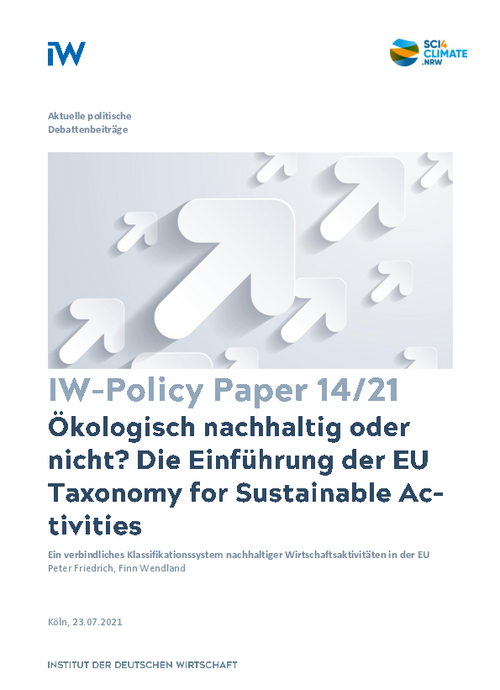The EU Taxonomy for Sustainable Activities (EU Taxonomy) is the lead instrument to integrate and promote sustainability in capital markets across the EU.

Ecologically sustainable or not?: The introduction of the EU Taxonomy for Sustainable Activities

The EU Taxonomy for Sustainable Activities (EU Taxonomy) is the lead instrument to integrate and promote sustainability in capital markets across the EU.
This study sheds light on the implications of the EU taxonomy for financial market participants and its potential to strengthen transparency and comparability of information for companies and investors. By setting qualitative and quantitative technical screening criteria, the EU taxonomy identifies the extent to which economic activities, businesses and assets are compatible with six overarching environmental targets. The alignment with the EU taxonomy should help companies to access new sources of sustainable finance on capital markets and to close the investment gap to achieve international climate targets. By integrating the environmental costs and long-term risks of climate change associated with certain economic activities into financial instruments, the EU taxonomy provides the potential to better link creditors and debtors, to improve the functioning and allocative efficiency of capital markets, and to leverage finance for sustainable investments. To strengthen its credibility and effectiveness over the long-term, the EU taxonomy should cover relevant sectors and actors of the entire economy, it should clarify remaining uncertainties on the interpretation of the binary classification system, and it should emphasize forward-looking investment plans and indicators in order to enable the green transformation.

Ecologically sustainable or not?: The introduction of the EU Taxonomy for Sustainable Activities

More on the topic
Financing the Sustainability Agenda
The EU has set legally binding targets for climate-neutrality by 2050. To succeed in the transition to a low-carbon economy, companies need to continuously develop new and improved climate-friendly technologies, and to adopt or move towards low-carbon business ...
IW
Is the EU Fit for 55 and Beyond?
Ursula von der Leyen was elected President of the European Commission by the European Parliament in July 2019. She assumed office in November 2019 and unveiled the European Green Deal in December 2019 (European Commission, 2023a) as a focal point of European ...
IW